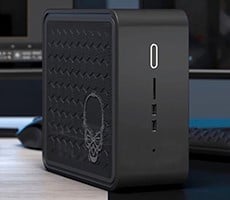Performance Summary: As configured, Alienware's Aurora R3 balances performance with cost. The system didn't rip through our benchmarks with reckless abandon, nor did it ever feel slow. Instead, the Aurora R3 we tested lands somewhere in the middle flirting with the upper end, a great place to be if you're wanting near rockstar performance without a big label price tag. The Intel Core i7 2600K processor provides a strong foundation to build upon, and the dual Radeon HD 6950 cards provide enough pixel pushing muscle to crank up the visual quality settings in most titles, and especially in games like Left 4 Dead 2. For those seeking a no-holds-barred computing experience, you'll need to spend some additional coin beefing up the weaker areas. The system configuration Alienware sent us was tempered by the lack of a solid state drive, just 4GB of DDR3-1333 memory, and mid-range videocards. Address these three areas and you'll have a gaming PC to be reckoned with. As it stands, the Aurora R3 is still a very scrappy PC.


For some, Alienware gave up its geek cred when Dell took over, and it doesn't help Alienware's case that the system we received came with the main 24-pin ATX power connector unplugged from the motherboard and a loose metal screw bouncing around the chassis. We're not here to make excuses for Dell or defend Alienware's decision, but we will point out that these construction mishaps aren't typical of anything we've experienced with prior Dell system reviews. Also, with the backing of a big OEM like Dell, Alienware systems are becoming more affordable to those who always assumed a boutique gaming PC would be out of reach.
Pricing for the Aurora R3 starts at $1,200; our configuration rang up at $2,450. There's still a markup involved, but it's not obscene, and ordering through Dell is the only way you can get a rad case like the one the Aurora R3 ships with. Alienware's DNA remains intact, from the overall design of the chassis, to the customizable lighting. Getting inside the system is as easy as it gets, and we wish all system builders would route power and SATA cables to the available drive bays like Dell did, which makes adding drives a snap.
The Aurora R3 obviously isn't for everyone, in particular those looking for a subdued PC to blend in with a conservative decor or anyone seeking a low noise PC. High end gamers with deeper pockets may also want a bit more oomph than the Aurora R3 provides. That leaves gamers hoping to score a flashy machine with a decent bang-for-buck ratio as the target audience, and that's not a segment Alienware served as much, before being scooped up by Dell. Haters will still hate, but if the only thing that's stopped you from abducting an Alienware system in the past was the price tag, then you need to probe the Aurora R3's product page more closely.

|

|

|
- Trademark Alienware styling
- Clean and easily accessible interior
- Intel Sandy Bridge platform is still tops
- Customizable lighting
- Two graphics cards are better than one!
|
- HD 6950 architecture isn't strong enough to drive demanding games on a 30-inch panel
- Gets loud when gaming
- Build quality feels rushed (unplugged 24-pin ATX power cord, loose screw)
|
![]()








